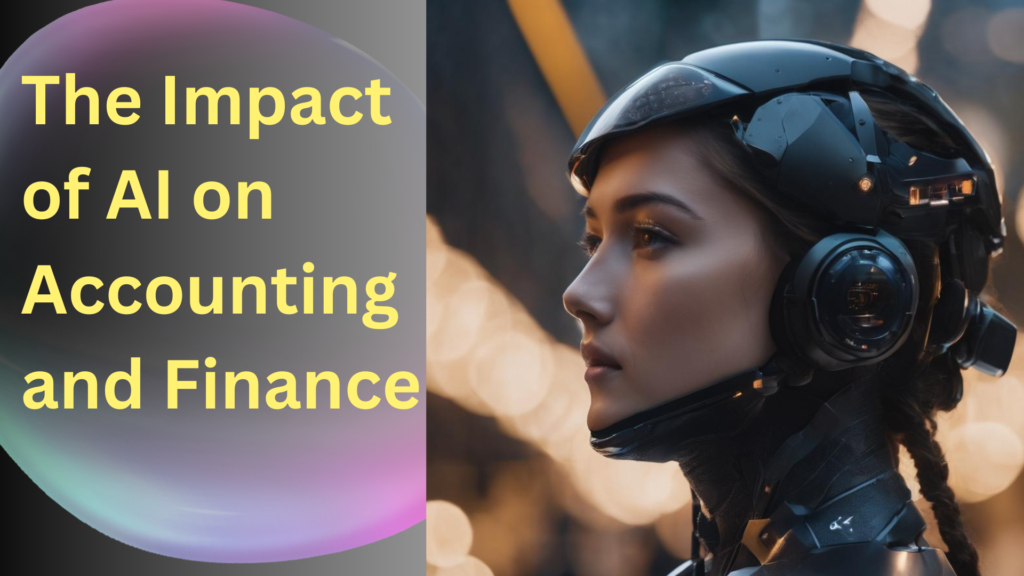
Introduction and understanding AI
At the point when we ponder the fields of bookkeeping and money, we frequently imagine numbers, accounting sheets, and complex monetary facts. However, with the advent of Artificial Intelligence (AI), these traditional disciplines are experiencing a significant transformation in how they are taught and practiced. In this article, we’ll explain how computer based intelligence is reforming bookkeeping and financial knowledge, giving bits of knowledge, and chances to succeed in these powerful fields.
How the impact of AI on accounting and finance will be taken care in the future. From robotized information examination to customized opportunities for growth, AI is reshaping the manner in which understudies learn and get ready for professions in bookkeeping and finance. How about we plunge into the captivating existence where numbers meet innovation!
How accounting and finance have been traditionally taught in schools ? Understand the Impact of AI on Accounting and Finance.
Traditionally, accounting and finance education in schools has followed a structured curriculum focused on foundational principles, theories, and practical applications. Here’s how these subjects have typically been taught:
- Students are introduced to fundamental concepts such as double-entry bookkeeping, financial statements, and accounting principles like GAAP (Generally Accepted Accounting Principles) or IFRS (International Financial Reporting Standards).
- Traditional teaching methods rely heavily on textbooks, lectures, and classroom discussions.
- Students apply theoretical concepts to real-world scenarios, analyze financial data, and prepare financial statements.
- Students are often trained to use accounting software such as Excel, QuickBooks, or SAP.
- Some programs offer internships or co-op opportunities where students gain hands-on experience in accounting firms, financial institutions, or corporate finance departments.
- Assessment methods typically include exams, quizzes, and projects to evaluate students’ understanding and proficiency in accounting and finance concepts.
Overall, the traditional approach to accounting and finance education emphasizes building a strong theoretical foundation, developing analytical skills, and providing practical experience to prepare students for careers in accounting, finance, auditing, taxation, and related fields.
However, with the emergence of AI, these traditional methods are being augmented and enhanced to meet the evolving needs of the industry and the demands of the digital age. So it is very important for the finance students to understand the future of their career and the impact of AI.
How AI’s ability to automate repetitive tasks like data entry and analysis ?
Just before the advancement of AI, people were burdened with tedious tasks that seemed never-ending. One such task was data entry and analysis. Imagine, rows upon rows of numbers, names, and figures waiting to be organized and understood. This was the realm of spreadsheets and databases, where humans toiled away their hours, manually inputting data and crunching numbers.
But then, something marvelous happened. Enter the hero of the era: Artificial Intelligence, or AI for short. This digital marvel possessed incredible powers that could transform the mundane into the miraculous. With its algorithms and processing prowess, AI set its sights on the repetitive world of data entry and analysis. With a wave of its virtual wand, AI began to automate these tasks.
No longer did humans need to spend countless hours typing in data or poring over spreadsheets. Instead, AI took on these burdensome duties with ease and efficiency. It could scan documents, extract information, and populate databases with lightning speed. Rows and columns filled magically, as if by unseen hands.
But AI’s powers didn’t stop there. It wasn’t content with merely entering data; it also excelled at analysis. With its keen analytical mind, AI sifted through mountains of information, uncovering patterns, trends, and insights that would have taken humans ages to discover. It could predict future outcomes based on past data, helping businesses make smarter decisions and scientists unlock the mysteries of the universe.

Benefits of incorporating AI into accounting and finance
In the world of accounting and finance education, students embarked on a journey filled with numbers, equations, and financial statements. They diligently learned the principles of debits and credits, balance sheets, and cash flow statements. Yet, they yearned for something more, something to bridge the gap between theory and practice, between textbooks and the real world.
With the incorporation of AI into their curriculum, students discovered a wealth of benefits awaiting them by understanding AI. First and foremost, AI offered a hands-on approach to learning. No longer were they confined to theoretical exercises; instead, they could interact with AI-powered tools and software, gaining practical experience in data analysis, financial modeling, and risk assessment.
But perhaps the most significant benefit of incorporating AI into accounting and finance education was its ability to prepare students for the ever-evolving landscape of the industry. As technology continued to advance, so too did the role of accountants and financial professionals. By learning to harness the power of AI, students gained a competitive edge in the job market, equipped with the skills and knowledge needed to thrive in a digital world.
Read more about
Does An Online Certificate Course Worthwhile Doing In 2024 ?
Concerns about job displacement and the importance of human oversight in using AI tools.
- where technology reigned supreme, there arose concerns about the impact of AI, on the workforce. As AI’s capabilities grew by leaps and bounds, so too did fears of job displacement among workers in various industries.
- At first, the promise of AI seemed almost magical. It could automate tasks, streamline processes, and boost efficiency in ways never before imagined. Businesses rejoiced at the prospect of cutting costs and increasing productivity.
- Many feared that Impact of AI on Accounting and Finance Career would render human workers obsolete, replacing them with algorithms and robots. Jobs that once required human expertise and intuition were now being performed by machines with lightning speed and unwavering accuracy.
- Yet, as the story unfolded, a crucial truth emerged: AI, for all its capabilities, still relied on human oversight and guidance. While AI excelled at tasks that involved repetitive patterns and data analysis, it lacked the empathy, creativity, and critical thinking skills that were uniquely human does.
- This realization underscored the importance of maintaining a balance between AI and human workers. Rather than viewing AI as a threat, businesses and organizations began to see it as a valuable tool to augment human capabilities.
- Moreover, human oversight became essential in ensuring the ethical and responsible use of AI tools. Human workers could provide context, interpret results, and intervene when necessary to uphold ethical standards and ensure fairness and accountability.
- And so, the tale of Impact of AI on Accounting and Finance Career and job displacement became a cautionary one, reminding us of the importance of human oversight in the age of automation. By embracing AI as a partner rather than a replacement, and by exercising vigilance and responsibility in its use, humans and machines could work together harmoniously to create a brighter future for all.
Read more about
How AI Will Impact The Future Of Work And Life
Importance of staying updated on AI advancements in the accounting and finance fields.
- In the dynamic realm of accounting and finance, there existed a quest for knowledge that knew no bounds. Professionals embarked on this journey, armed with their calculators and spreadsheets, seeking to navigate the ever-changing landscape of numbers, regulations, and market trends
- As Impact of AI on Accounting and Finance Career a powerful force reshaping the practices and processes of accounting and finance.
- However, with great power came great responsibility. As AI continued to evolve, so too did the need for professionals to stay updated on its advancements. Those who failed to keep pace risked falling behind, unable to harness the full potential of AI to enhance their work and drive innovation in their organizations.
- Staying updated on AI advancements in the accounting and finance fields was not merely a matter of keeping up with the latest trends; it was essential for maintaining relevance and competitiveness in an increasingly digital world. Professionals needed to familiarize themselves with AI tools and technologies, understanding their capabilities, limitations, and implications for their work.
- Moreover, staying updated on AI advancements enabled professionals to anticipate and adapt to changes in their industries.
- Furthermore, staying updated on AI advancements empowered professionals to leverage AI effectively and ethically in their work.